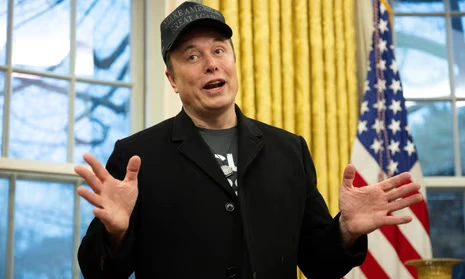NEWS
Musk Considers ‘DOGE Dividend’ Plan to Return Savings to Taxpayers
Elon Musk has shown interest in a proposal that suggests using the savings generated by the Department of Government Efficiency (DOGE) to issue a “DOGE dividend”—a tax refund payment for hardworking American taxpayers. This idea was put forward by James Fishback, a user on X, who argued that 20% of the savings identified by DOGE should be returned to taxpayers in the form of a check.
Fishback’s post laid out a scenario where, if DOGE successfully cuts $2 trillion in federal spending, approximately 78 million taxpaying households in the United States could each receive around $5,000. The remaining savings, under this plan, would be allocated toward reducing the national debt. Musk responded to this suggestion by saying, “Will check with the President,” indicating that he was open to discussing the idea further with Donald Trump.
Musk has been vocal about the importance of reducing the national deficit. Speaking on Fox News’ “Hannity” during a joint appearance with Trump, Musk explained that DOGE aims to cut a trillion dollars from the deficit. He warned that if the deficit is not brought under control, the United States could face financial ruin, comparing the country’s financial situation to that of an individual.
“The overall goal is to try to get a trillion dollars out of the deficit,” Musk said. “If the deficit is not brought under control, America will go bankrupt. A country is no different from an individual in that if an individual overspends, they can go bankrupt. And so can a country.”
He highlighted the massive waste, fraud, and abuse contributing to the country’s growing deficit, which currently stands at around $2 trillion annually. Musk believes that addressing these inefficiencies is crucial to ensuring the country’s financial stability.
DOGE, which has been working to identify and eliminate unnecessary federal expenditures, claims to have already achieved approximately $55 billion in savings. These savings have come from actions such as canceling unused federal leases and contracts, selling off government assets, identifying and eliminating fraud, streamlining regulations, and reducing workforce redundancies.
While Musk appeared to support the idea of a DOGE dividend when he first responded to Fishback’s post, he later clarified his stance. On Wednesday morning, he posted a response to Scott Adams, the creator of Dilbert, who raised concerns that the DOGE dividend might result in the government treating DOGE savings as a “piggy bank” instead of focusing on necessary budgetary discipline. Musk’s reply emphasized that balancing the budget should be the first priority. “We need to balance the budget as first priority,” he wrote, signaling that while returning money to taxpayers is an appealing idea, his primary concern remains tackling the overall deficit.
The federal government reported a budget deficit of over $1.8 trillion in the fiscal year 2024, according to data from the Congressional Budget Office (CBO). Projections indicate that this deficit is expected to exceed $2 trillion annually in the coming years. This poses a significant challenge for both DOGE and the Trump administration, should they aim to close the budget gap entirely.
During Musk’s interview with Trump on Hannity, the conversation revolved around fiscal responsibility and government spending. Musk argued that the key to saving taxpayer money lies in two essential factors: competence and genuine care for the country’s financial health. He pointed out that many government inefficiencies stem from bureaucratic mismanagement and a lack of accountability in spending decisions.
DOGE has also taken steps to involve the public in its cost-saving mission. The agency recently launched accounts on X that allow citizens to submit tips on ways the government could reduce wasteful spending. This crowdsourced approach aims to identify inefficiencies that might otherwise go unnoticed by bureaucratic oversight.
Despite the growing conversation around the potential for a DOGE dividend, Musk’s latest comments indicate that he believes it is more important to focus on balancing the budget rather than issuing refund checks. While some Americans may have welcomed the idea of a tax refund generated from government savings, the broader fiscal challenge remains at the forefront of Musk’s and DOGE’s priorities.
Musk’s position underscores the importance of addressing the root causes of the deficit before considering additional financial incentives for taxpayers. Although he initially appeared intrigued by the proposal, his subsequent statement suggests that he views budgetary responsibility as the more pressing issue. The coming months will determine whether DOGE can achieve its ambitious cost-cutting goals and whether any portion of those savings will ultimately be returned to taxpayers.
For now, the focus remains on reducing unnecessary spending, tackling fraud, and ensuring that the federal government operates with greater efficiency. With the national deficit continuing to rise, the success of DOGE’s mission will be crucial in determining the country’s financial trajectory in the years ahead.